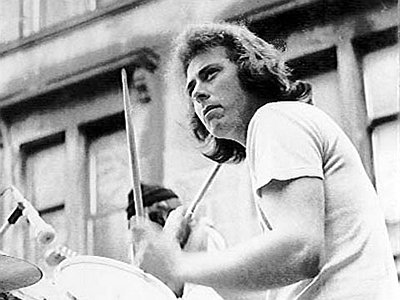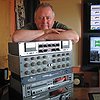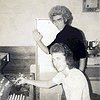The receiving end
It has often been suggested that "the future of music is in live”. How do you feel about the ongoing relevance of recordings as an art form? What can recordings provide what a concert cannot?
With lower physical sales, there is more importance in live performances to earn the artists more revenue. Many artists enjoy performing live, but others are not happy in that environment, preferring to remain anonymous to an audience. Certain forms of music is better listened to in a home situation, and doesn’t lend itself to being performed live. Also, the way some music is created, it is difficult to perform live.
A studio or home recording can achieve a level of perfection in sound and performance. Some artists do not have the ability to reproduce their recordings in a live situation, and there isn’t anything wrong with that, it’s just a different approach. Of course there are bands that sound better live than anything they’ve recorded in a studio, so they tend to have a different type of listener, one who prefers hearing them in a concert situation. I think both avenues are good, and appeal to totally different listeners.
Usually, it is considered that it is the job of the producer and/or mastering engineer to make a recording sound great. But listening is also an active, rather than just a passive process. How do you see the role of the listener in the musical communication process?
The producer tries to get the best from the artist, often adding things the artist had not thought of. As a mastering engineer, it is my job to get the best sound and transfer from what I’m given; and sometimes suggest things to improve the recording further. For the listener, it depends on the individual. Some just enjoy music in the background, some like their music to give them a great feeling, a high, to dance around. Others enjoy great lyrics, and are studious listeners. Then you have the ear buds to superb hi-fi environments. This makes a huge difference to how you listen, and your own personal involvement.
Personally, I prefer buying CDs, reading sleeve notes, and appreciating good artwork. I still import them into iTunes, so I can quickly check tracks for my radio shows, but I still have the originals to play; I demand the quality. Many consumers only download these days, and don’t even listen to an album anymore; just one track here and there. I think that’s a shame as many artists record an album that works as a whole, and is better listened to in that way. I think it’s sad that people are losing that way of enjoying music.
Please recommend two recording/mixing/mastering engineers to our readers that you feel deserve their attention.
Phill Brown is an excellent engineer. Starting his career at the legendary Olympic Studios, and working with many great artists. I‘ve mastered many of Phill’s recordings and, or mixes, and they are always a pleasure to work with.
I think very highly of Bob Ludwig as a mastering engineer. He has great ears, great equipment, and a great room. Everything I buy that he’s mastered always sounds good, and has a great frequency balance that reflects what he has brought to the project.
Read more about Denis Blackham at www.skyemastering.com








